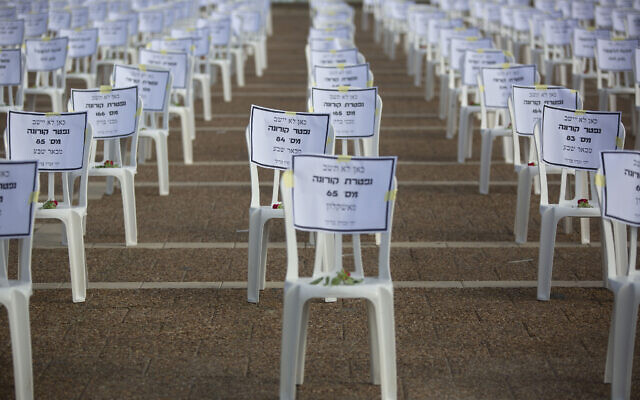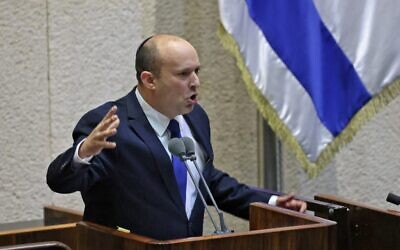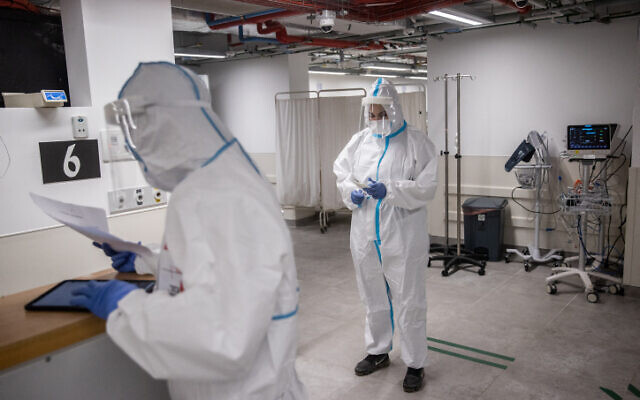Following criticism of statement defending government’s decision to find ways to live with the virus, interior minister says comments ‘should have been worded differently’

Interior Minister Ayelet Shaked faced criticism Tuesday night after she appeared to minimize the loss of life caused by the coronavirus as she defended the new government’s response to the latest outbreak.
Shaked was attempting to explain the meaning of the government’s decision to pursue policies that will allow Israel to live with the pandemic rather than attempt to contain it via restrictive measures when she noted that the country will need to learn to accept the death toll that comes with a health crisis.
“We have to to know how to accept severe cases and also to accept deaths, because this is a pandemic and in a pandemic people die,” she said during an interview on Channel 13 news. “It’s happening all over the world right now.”
Shaked’s comments came hours after the Health Ministry announced Tuesday morning that the death toll from COVID-19 since the start of the pandemic had risen to 6,571, signifying 12 more deaths since a day earlier.
Over 4.3 million people worldwide have died from COVID-19, making it amoing the deadliest pandemics in modern times.
Over 6,300 new cases of COVID-19 were confirmed in Israel on Monday, the highest single -day tally since early February, and some health experts have warned that the government will be unable to stem the tide of mounting cases without implementing serious restrictions on gatherings or movement, which the government has shied from.

Shaked drew almost immediate fire for her remarks, mainly from the political opposition, which has sought to portray the government as unable to control the pandemic and has blamed it for the resurgence of the virus, though health experts attribute the renewed spread to the highly contagious Delta variant.
Religious Zionism MK Ofir Sofer wrote on Twitter that “Shaked’s wretched comments reveal the government’s failed handling” of the pandemic.
Some pointed out that Prime Minister Naftali Bennett, who heads Shaked’s Yamina party, had in January angrily pilloried the previous government from the Knesset podium for not taking pandemic fatalities seriously.
“People are dying, what are you doing,” Bennett had yelled from the Knesset rostrum at the time. “Have you lost your minds?”
Shortly after the interview, Shaked released a clarification saying that “every death is a world unto its own, and human life is a supreme and sacred value.”
She said the intention of her comments has been “to explain the price of continuing to deal with the global epidemic… It should have been worded differently.”
Bennett on Tuesday moved to expand the Green Pass system, which restricts entry to some venues to those who have been vaccinated or recovered from the virus, according to several Hebrew-language media reports. The cabinet will vote on the measures Wednesday.
Government officials maintain that efforts are aimed at avoiding a fourth nationwide lockdown, a measure which a number of ministers have claimed is ineffective and causes more harm than good.

On Monday, Finance Minister Avigdor Liberman told reporters that “it is not clear that there is a correlation between lockdowns and a decrease in the number of cases and seriously ill patients, but it is clear that there is a correlation between lockdowns and economic damage.”
He added that just as Israelis “know how to live alongside the flu, the same thing [should be the case with the] coronavirus.”
However, health professionals, including Health Ministry Director Nachman Ash, say that a lockdown may be inevitable if Israel wants to bring case numbers down.
“I don’t want a lockdown, but it’s unavoidable and will come at a time when we are not prepared for it,” Prof. Masad Barhoum, the head of Western Galilee Medical Center in Nahariya, told Army Radio Tuesday.

In the Channel 13 interview, Shaked said that the government, which entered office in early June just as the new wave of infections was beginning, was not caught off guard by the surge in cases.
“There was no complacency at all and there was no lack of understanding,” she said when asked if the newly installed ministers had been overconfident and underprepared for the possibility of a COVID-19 resurgence on their watch.
Opposition Leader Benjamin Netanyahu, Prime Minister Naftali Bennett’s predecessor, tore into the incumbent premier over the morbidity spike Tuesday. “Israel did not need to reach this failure,” he said in a statement.
As reported by The Times of Israel
